- Home
- Color Management
- Discussions
- Should I check the "Embed Colour Profile" box when...
- Should I check the "Embed Colour Profile" box when...
Should I check the "Embed Colour Profile" box when saving as jpg/PDF?
Copy link to clipboard
Copied
I would be so grateful if somebody could tell me whether this box should or should not be checked. Is the answer the same whether I am saving as RGB or CMYK, should it always be checked, or never be checked? I can't find a clear answer on a google search!
At the moment, I do NOT check it if I am saving as CMYK as I then get a hazy film over the jpg's, like they are washed out. If I am saving as RGB then I DO check it.
I just would love to know the correct answer!
Thanks ![]()
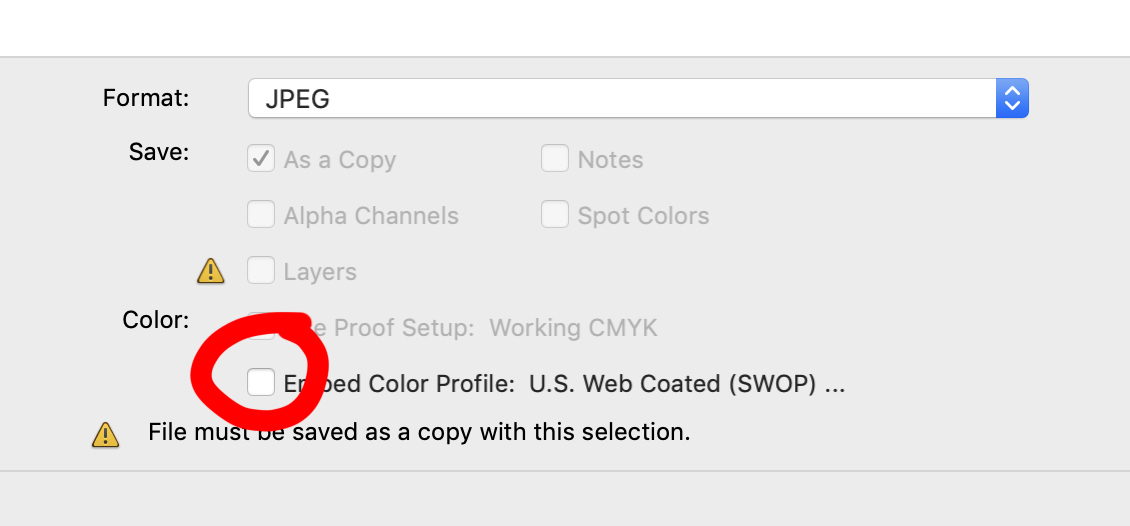
Copy link to clipboard
Copied
What is the purpose of the files - how will they be used, exactly? With what software, if you know?
Copy link to clipboard
Copied
Thank you. For the RGB files they will be viewed onscreen, so I check it when I save as RGB and it saves fine. For CMYK it is sending to print, and I leave it unchecked then. It just seems to be the only way that works for me, and I have had no issues saving this way, I just would love to know for sure that I am saving them correctly.
Copy link to clipboard
Copied
For CMYK it is sending to print, and I leave it unchecked then. It just seems to be the only way that works for me, and I have had no issues saving this way, I just would love to know for sure that I am saving them correctly.
A CMYK image without a profile is an absurdity.
The CMYK space (the ICC profile) describes the intended print process, the primary colors, the GCR or UCR (how the three colors contribute to gray), the TAC (Total Area Coverage, how much total ink any point of an image may contain), …
Without that information any necessary corrections become guesswork and the results may vary considerably.
Within certain confines of time and space the receiving party may make a good, educated guess as to your Woking Space and achieve satisfactory results but after a few years (Standards can change) or on another continent (different places employ different Standards) the results might become more unpleasant.
Please read up on Color Management.
Copy link to clipboard
Copied
Do many print providers ask you to provide CMYK images?
To which CMYK Target Space do they usually tell you to separate the images?
Which print processes do you usually work for?
Copy link to clipboard
Copied
For CMYK it is sending to print, and I leave it unchecked then. It just seems to be the only way that works for me, and I have had no issues saving this way, I just would love to know for sure that I am saving them correctly.
Do you know for sure that the print destination for the CMYK file is in fact US Web Coated SWOP—the final printing will be on a web offset press running to that profile?
In most cases there is no reason to make CMYK conversions in Photoshop, because the final conversion can be made when the InDesign(?) document layout is exported, or from the RIP when the final CMYK destination is known.
If US Web Coated SWOP is in fact the correct CMYK space, it doesn’t matter if you include the profile because there will be no further color managed conversions downstream. If your CMYK file gets placed in a layout with US Web Coated SWOP assigned, and the PDF export is to document CMYK, the CMYK values wont change whether the image has the profile embedded or not.
Copy link to clipboard
Copied
If US Web Coated SWOP is in fact the correct CMYK space, it doesn’t matter if you include the profile because there will be no further color managed conversions downstream.
I work in Europe and I have occasionally gotten CMYK files with »U.S. Web Coated …« from other sources in Europe – that usually seems more like a sign of somebody not paying a lot of attention to color management and not correcting the default Color Settings than of them expecting the files to be printed in North America.
But if those people were to not embed the profile …
Copy link to clipboard
Copied
I work in Europe and I have occasionally gotten CMYK files with »U.S. Web Coated …« from other sources in Europe
Right that‘s my point, if the OP doesn’t really know the final print destination, making the random CMYK conversion with or without an embedded profile is the bigger problem.
Copy link to clipboard
Copied
I would be so grateful if somebody could tell me whether this box should or should not be checked. Is the answer the same whether I am saving as RGB or CMYK, should it always be checked, or never be checked?
Naturally it should be checked.
A certain combination or RGB or CMYK values does not actually describe a human color perception unless it is connected to a Color Space (usually described by an ICC Profile).
So without the profile one can say that one pixel is darker, more red, … than another pixel in the same image but not what it is actually supposed to look like.
Similar to the scale of a map: If one does not know the scale one may determine that the distance between point A and point B is bigger than between point A and point C but one would not know what the actual distance is.
Copy link to clipboard
Copied
Thank you ![]() I am going to be honest and say I don't really understand what you mean, I am completely self taught so have missed out on all the technical side of things and have learnt by trial and error. I guess its something that has been annoying me for a while so I am just trying to make sure the way I am saving is correct. The only reason I leave it unchecked, is because if I am saving as a CMYK file and I check the box, it seems to look very opaque/washed out, if I then uncheck it, it is clear and bright.
I am going to be honest and say I don't really understand what you mean, I am completely self taught so have missed out on all the technical side of things and have learnt by trial and error. I guess its something that has been annoying me for a while so I am just trying to make sure the way I am saving is correct. The only reason I leave it unchecked, is because if I am saving as a CMYK file and I check the box, it seems to look very opaque/washed out, if I then uncheck it, it is clear and bright.
Copy link to clipboard
Copied
Embedding color profile is not ideal if you're saving for the web, as it's not really used for online images! If you need to save some in the file size definitely uncheck that!
Copy link to clipboard
Copied
Embedding color profile is not ideal if you're saving for the web, as it's not really used for online images!
While not all versions of all browsers utilize color management that seems like a problematic statement to me.
And it seems to rests on one working in sRGB or converting to sRGB when exporting images.
Copy link to clipboard
Copied
andreamaestri wrote
Embedding color profile is not ideal if you're saving for the web, as it's not really used for online images! If you need to save some in the file size definitely uncheck that!
An sRGB profile is 3 kB. Back when we had dial-up modems that made a difference - but today it's utterly insignificant.
Always embed the profile. End of story.
Copy link to clipboard
Copied
As for pdfs: One should always save PDF/X anyway and those will include the Output Intent regardless of the setting in the save-dialog.
Copy link to clipboard
Copied
Yes, a press-ready PDF is a somewhat special case - but no contradiction of the principle. You still need the profile, but in the form of a stated output intent. It is assumed that no further color management will take place, and the file you submit is already in the target color space - namely, the press/paper/ink it will be printed with.
The principle is still the same. The profile is there, only in this case in "terminal" form: it has been baked into the data which will not change again. It has reached its final destination. Which is why it's crucial that the correct CMYK profile has been used, the one that actually corresponds to the print process.
The reason you embed the profile elsewhere, is that the final destination is unknown. Or there may be multiple destinations - print, screen, multiple different screens. So several downstream conversions will inevitably happen.
Copy link to clipboard
Copied
Should I check the "Embed Colour Profile" box when saving as jpg/PDF
Also, with PDF out of Photoshop it‘s the Profile Inclusion Policy in the PDF dialog‘s Output tab that determines profile embedding—it overrides the Save dialog’s Embed Color Profile checkbox. So a PDF/X-1a would save without a profile even if you check the Save>Embed Color Profile box, because the X-1a standard does not allow embedded profiles.
Copy link to clipboard
Copied
So a PDF/X-1a would save without a profile even if you check the Save>Embed Color Profile box, because the X-1a standard does not allow embedded profiles.
But the standard categorically requires an Output Intent, see D Fosse’s post for example.
Copy link to clipboard
Copied
But the standard categorically requires an Output Intent
Right, but the Output Intent doesn't act like a profile—if you place the PDF in an InDesign layout the Output Intent is not recognized.
With a SWOP PDF/X-1a placed in an InDesign page layout with GRACol Coated assigned, the PDF is going to get the GRACol assignment and color appearance. If I then export the InDesign doc to a default PDF/X preset, the Output Intent will now be GRACol and the original Photoshop CMYK output numbers will be unchanged—there would never be a SWOP-to-GRACol conversion.
Copy link to clipboard
Copied
Right, but the Output Intent doesn't act like a profile—if you place the PDF in an InDesign layout the Output Intent is not recognized.
But in my opinion that should not matter.
• As D Fosse stated in post 11 the pdf should ideally be in the correct Color Space and need no further editing.
The profile is there, only in this case in "terminal" form: it has been baked into the data which will not change again.
• If one receives pdfs (from multiple sources) one should preflight those anyway and request corrected ones or amend them as necessary.
Copy link to clipboard
Copied
But in my opinion that should not matter.
It does if the PS file gets placed in a page layout—I think it would be fair to say that most Photoshop images headed for an offset press (SWOP is an offset profile) are going to be placed in a page layout and not output directly from Photoshop.
It is understandable that you would think the PDF/X output intent is the same as a profile—in the PDF/X dialog it is Output Intent Profile Name—but when the file is placed in an InDesign document the output intent is not used for color management.
That’s easy enough to show with a simple Photoshop CMYK fill saved in different formats and placed in a page layout.
Here‘s a PSD CMYK file filled with 0|0|0|50K, and with US Web Coated SWOP embedded.
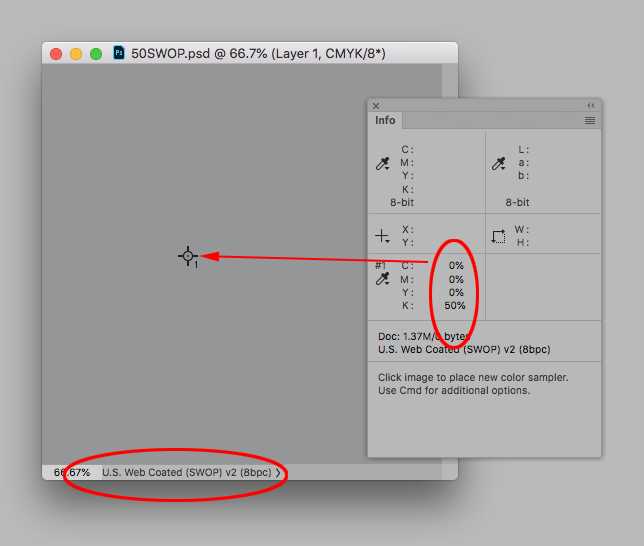
I’ve saved the file three ways: a PSD with the profile embedded, a PSD with no profile embedded, and as a Photoshop PDF using the default PDF/X-1a preset. I’ve place the 3 files in an InDesign document with GRACol Coated as the CMYK assignment, and Preserve Embedded Profiles as the Policy—Separation Preview shows the output numbers.
The top version has the embedded SWOP profile, which conflicts with the InDesign document’s GRACol profile—the Link Info shows the embedded profile. Because of the conflict, the original 50K value gets converted to a 4-color gray.
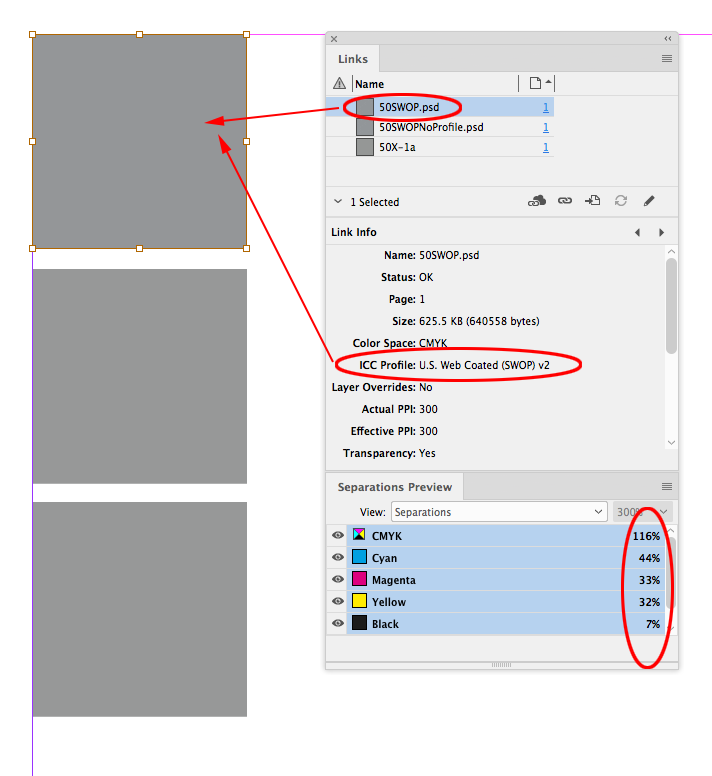
The version with no profile embedded gets Document CMYK (GRACol) as the assignment and keeps its original output values—there's no conversion.
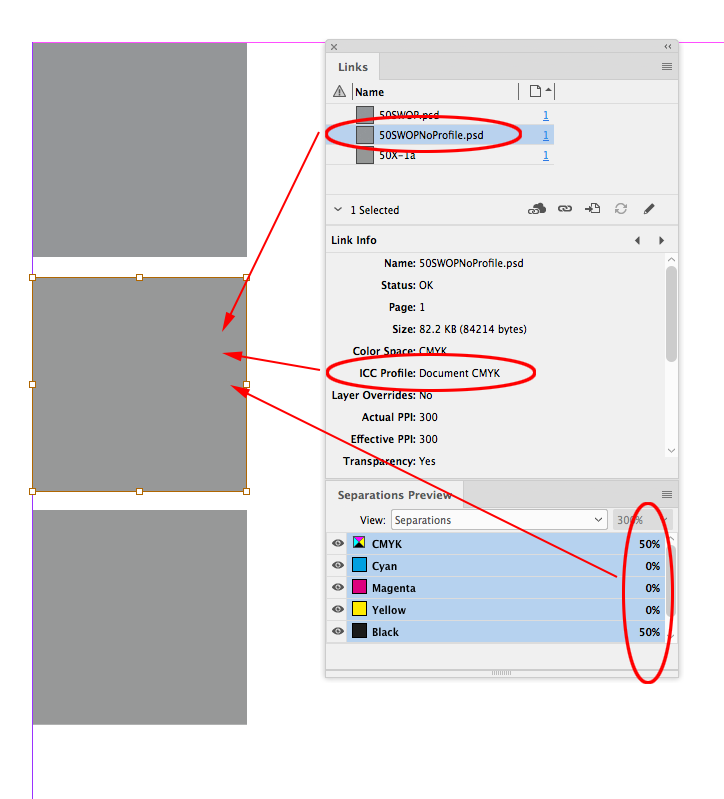
The PDF/X-1a version acts the same as the no profile version—InDesign doesn't do anything with the X Output Intent Profile Name.
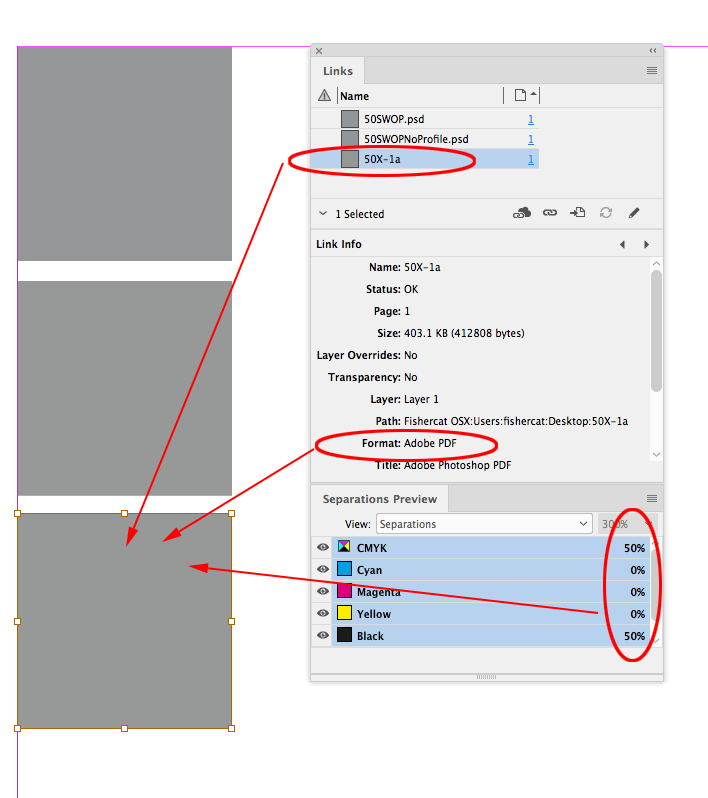
If I then export the InDesign document to PDF/X-4, its Output Intent Profile Name will be GRACol Coated not SWOP. The placed PDF/X-1a and the PSD with no profile embedded, will both be listed as DeviceCMYK (no profile) in Acrobat. In the final PDF from the layout there is no indication that the bottom image originated as SWOP CMYK.
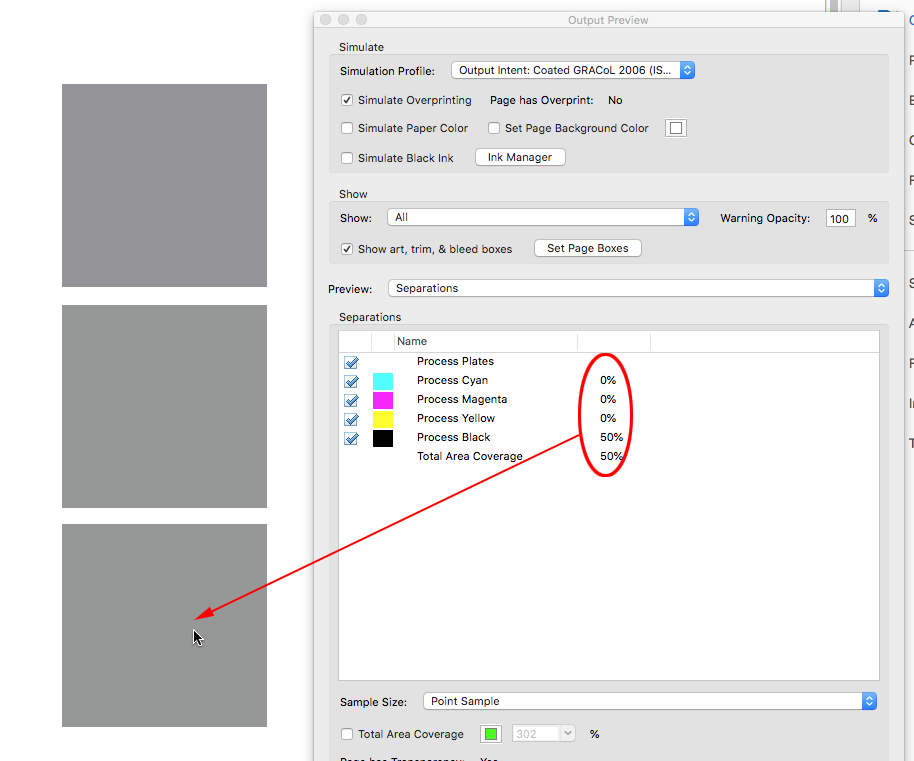
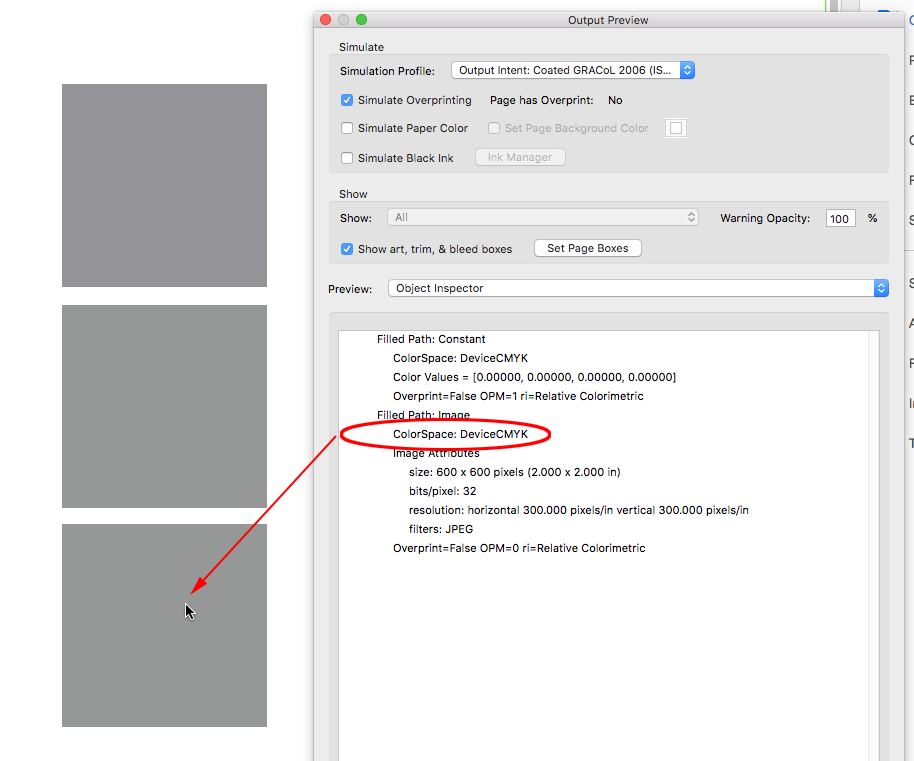
Copy link to clipboard
Copied
I think the assumption here - c.p.s and mine - is a press-ready PDF, the final end product of the whole process.
The point is that re-editing that PDF in InDesign isn't what you would call standard procedure - rather a band-aid emergency repair. As such you naturally need to take some special precautions.
As a press-ready PDF is intended, no further conversions should happen, and therefore there is no need to include the profile. A profile is only there for future conversions. The output intent is just information about the intended destination.
Copy link to clipboard
Copied
The point is that re-editing that PDF in InDesign isn't what you would call standard procedure - rather a band-aid emergency repair. As such you naturally need to take some special precautions.
There‘s no re-editing going on—InDesign accepts PDF as well as image formats for placing and it is common practice to place PDF rather than an image format for any PS document that uses a type layer to prevent the type from being rasterized.
Of course you can save a PDF with a profile, I was only pointing out that the PDF Save dialog’s Embed Color Profile is overridden by the PDF Preset’s Output Profile Inclusion Policy choice.
CMYK by definition is press ready, there's no point in making a CMYK conversion for the wrong press. If the OP has communicated with the printer and knows the output will be SWOP, it would not matter if a profile is included or not because there will be no further conversions. If there's been no communication, the conversion to any CMYK space with or without an embedded profile is a color management mistake.
Copy link to clipboard
Copied
It does if the PS file gets placed in a page layout—I think it would be fair to say that most Photoshop images headed for an offset press (SWOP is an offset profile) are going to be placed in a page layout and not output directly from Photoshop.
But why would anyone save a pdf of a Photoshop image that is to be placed in Indesign and not a tif or psd?
It is understandable that you would think the PDF/X output intent is the same as a profile
Did I make that claim?
If I remember correctly I stated that a PDF/X has to have an Output Intent – which is a clear indication of the output it is intended for.
If people overlook or strip that information (by placing the image in Indesign without proper preflighting for example) that problem is not the fault of the person that created the pdf.
Copy link to clipboard
Copied
But why would anyone save a pdf of a Photoshop image that is to be placed in Indesign and not a tif or psd?
Because if you set type in a Type layer you have to place PDF, otherwise the text will be rasterized. Also InDesign doesn’t recognize 16-bit with image formats, so if for some reason you wanted 16-bits to get through to the final PDF, you’ll have to save as PDF/X with Convert 16-bit image to 8-bit unchecked, and then export from ID with compression turned off.
Copy link to clipboard
Copied
Because if you set type in a Type layer, you have to place PDF, otherwise the text will be rasterized.
I was talking about an image, talking about more complex layouts let me ask: Which professional graphic designer or photographer would create a layout that includes text and other vector content in Photoshop? (The absence of Bleed Box and Trim Box alone should discourage that,)
And technically eps can also include the vector data (though the format is practically obsolete).
Still: What you perceive as a problem with PDF/X-1a would naturally also apply to pdfs created in Indesign, Illustrator or others.
But professional printers should be expected to preflight that stuff before processing it further on my opinion.
Find more inspiration, events, and resources on the new Adobe Community
Explore Now
